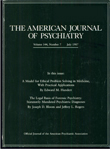TO THE EDITOR: We read with interest the clinical case conference “Childhood-Onset Psychosis: Evolution and Comorbidity” by Joseph Gartner, M.D., and associates (
1) and wish to comment on what we see as a significant omission in the differential diagnosis in this interesting and complex case.
Psychotic-like symptoms with an early onset can be a manifestation of a dissociative disorder, as well as bipolar disorder, neurological conditions, or schizotypal personality disorder. Dissociative disorders in children have been increasingly described in the child psychiatry literature and are now included in major child psychiatry textbooks (
2,
3).
Children with dissociative identity disorder and dissociative disorder not otherwise specified often present with symptoms similar to those of Edward in the case conference, including auditory hallucinations, conversations with imaginary friends, unexplained rapid behavioral changes, dazed states, unusual nighttime experiences, and fluctuating academic and intellectual performance (
4). Finally, studies of children with dissociative diagnoses indicate that a history of abuse can be documented in 95% of cases (
5), and it is noted that suspicions of abuse were raised in Edward's case on at least two occasions. Although our knowledge of dissociative conditions in children is at this time rudimentary, dissociative symptoms should alert the evaluator to look carefully for a possible traumatic etiology. In addition, recognition of dissociative symptoms might alter the psychotherapeutic or psychopharmacological approach.
Dissociative symptoms can coexist with other childhood psychiatric conditions (
6). In fact, an underlying mood disorder, cognitive disorder, or pervasive developmental disorder may lower a child's threshold for coping with a traumatic environment and therefore make the child more vulnerable to the development of comorbid dissociative symptoms.
In these complex cases where auditory hallucinations, dramatic role playing, fluctuating behaviors, and state changes are present, the evaluator can use a combination of interviewing techniques, screening measures, careful history taking, and psychological testing to obtain a more complete diagnostic picture that includes dissociative symptoms (
6).
It is our hope that as dissociative disorders become more well-known among child psychiatrists, many complex cases may be better understood and treated more effectively.

